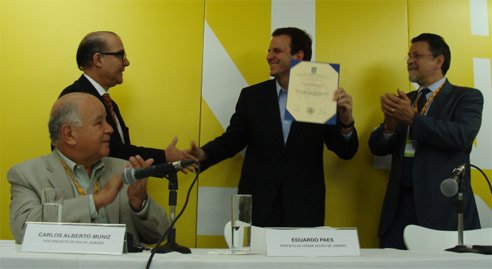The City of Rio de Janeiro and the World Bank have launched a ground-breaking, city-level program to put into action the city's goals for low-carbon development.
Certified according to the new Low Carbon City Development Program Assessment Protocol, developed by DNV KEMA based on the standards ISO 14064-2, ISO 14001, and the GHG Protocol, the program will help Rio de Janeiro monitor and account for low carbon investments and climate change mitigation actions across different sectors in the city. The Program is a business model that can be applied to other cities around the world. Cities currently account for over two-thirds of the world's energy consumption and 70 percent of global greenhouse gas emissions.
This is a timely initiative as the City of Rio de Janeiro prepares for a massive influx of investment, particularly in infrastructure, ahead of the FIFA World Cup in 2014 and the Summer Olympics in Rio in 2016. The program assists Rio in securing a low-carbon growth trajectory and respecting the city's rich natural resources according to a news release issued during the Rio+20 Summit.
"Rio de Janeiro is a leader in the area of climate change mitigation. We were the first Brazilian city to set concrete and bold goals to reduce greenhouse gas emissions. At the end of this year, Rio will have reduced its emissions by 8%. By 2020, this will amount to 20%. We have a large emissions inventory and, with the support of the World Bank, we are launching a transparent and reliable method to account for all of the city's mitigation activities," said Eduardo Paes, Mayor of Rio de Janeiro, at the launch ceremony.
Rio de Janeiro's target is to secure 2.3 million metric tons of emission reductions through 2020, which is the equivalent of 20 percent of the city's 2005 emissions. The city aims to achieve this target through a variety of projects and policies across a number of urban sectors. Some of these are already underway, such as doubling the city's network of bike paths, the opening of the first of four exclusive Bus Rapid Transit (BRT) lanes, and the setup of basic sanitation in Zona Oeste, the city's most populous area.
The Rio Low Carbon City Development Program implements a framework of data collection and analysis to promote low carbon projects, as well as quantify and validate emission reductions over time. Emission reductions from the program may be either accounted towards Rio's targets or sold as carbon offsets. The program includes two initial pilot projects in the areas of urban forestry and non-motorized urban transport.
"We are honored to have Rio as one of our key partners in addressing the two mega-trends of the 21st century: urbanization and climate change," said Hasan Tuluy, World Bank Vice President for Latin America and the Caribbean. "The certification for such a comprehensive, municipal climate change program is a first-of-its-kind and turns Rio's Low Carbon City Development Program into a business model for climate change mitigation at city-level."
"We consider it an honor to be part of this ground-breaking project, working with the World Bank to assist the City of Rio de Janeiro on its path towards a low carbon future," said Miguel Rescalvo, head of climate change services Americas for DNV KEMA Energy & Sustainability.
Explaining the purpose of the validation, Rescalvo said, "Briefly, it's to have an independent third party assessment of the program and the generic information relevant to all activities to be included under the program. In particular, the scope and boundary of the program, the objectives and targets, the eligibility criteria, the roles responsibilities and authorities, the control of records, the monitoring and reporting of program's performance, and the compliance with relevant local regulation are validated in order to confirm that the program is sound and reasonable and meets the identified criteria. Also, the validation of the program is considered important to provide assurance to stakeholders of the quality of the program and it's intended to assist a low carbon development of the city."
The program is expected to expand to other sectors in the near future, including bus rapid transit lines, recycling policies, energy efficiency in buildings and street lighting.
About DNV KEMA Energy & Sustainability
DNV KEMA Energy & Sustainability, with more than 2,300 experts in over 30 countries around the world, is committed to driving the global transition toward a safe, reliable, efficient, and clean energy future. With a heritage of nearly 150 years, we specialize in providing world-class, innovative solutions in the fields of business & technical consultancy, testing, inspections & certification, risk management, and verification. As an objective and impartial knowledge-based company, we advise and support organizations along the energy value chain: producers, suppliers & end-users of energy, equipment manufacturers, as well as government bodies, corporations and non-governmental organizations. DNV KEMA Energy & Sustainability is part of DNV, a global provider of services for managing risk with more than 10,000 employees in over 100 countries. For more information on DNV KEMA Energy & Sustainability, visit www.dnvkema.com.


